Bisphosphonate & Calcium Timing Calculator
Check Your Timing
Calculate if your bisphosphonate and calcium supplement timing will allow proper absorption. Follow these rules for optimal results:
Timing Analysis
Set your timing above to see your results.
Why Your Calcium Supplement Might Be Ruining Your Osteoporosis Medication
You take your bisphosphonate first thing in the morning. You follow the instructions. You wait 30 minutes. You eat breakfast. But your bone density keeps dropping. What’s going on?
The problem isn’t that the medicine doesn’t work. It’s that you’re taking calcium at the wrong time.
Bisphosphonates like alendronate (Fosamax), risedronate (Actonel), and ibandronate (Boniva) are powerful drugs designed to stop bone loss in osteoporosis. Studies show they can reduce fracture risk by up to 70%. But here’s the catch: if you take them with calcium - even a single pill - your body absorbs less than 10% of the drug. Some studies show absorption drops by 94% when calcium is present.
This isn’t a minor issue. It’s the most common reason bisphosphonate treatment fails. Patients take the pill. They think they’re doing everything right. But because they took their calcium with breakfast, or even 10 minutes before, the drug becomes useless. No absorption. No benefit. Just wasted money and rising fracture risk.
How Calcium Blocks Bisphosphonates
Bisphosphonates are tricky molecules. They’re designed to bind to bone, but before they get there, they have to pass through your gut. And your gut hates them. Only about 1% of the dose gets absorbed - that’s how poorly they work on their own.
Calcium makes it worse. When calcium and bisphosphonates meet in your stomach or intestines, they stick together like glue. They form a hard, insoluble compound that your body can’t absorb. It just passes through and comes out in your stool.
This isn’t theory. A 2019 study in the Journal of Clinical Pharmacology tested this directly. People who took alendronate with 1,000 mg of calcium carbonate absorbed 94% less of the drug than those who took it with plain water. Calcium citrate wasn’t much better - absorption dropped by 88%.
It doesn’t matter if it’s a pill, a chewable, or a glass of milk. Calcium is calcium. And it will block your bisphosphonate every time.
The Exact Rules for Taking Bisphosphonates
There’s no wiggle room. If you want your bisphosphonate to work, you must follow the rules exactly.
- Take your pill first thing in the morning, on an empty stomach. That means no food, no coffee, no tea, no juice - not even a sip of anything but plain water.
- Swallow it with a full glass (8 oz) of plain water. Don’t use sparkling water, mineral water, or any other kind. Only plain tap or bottled water.
- Wait at least 30 minutes (for alendronate) or 60 minutes (for risedronate) before eating, drinking anything else, or taking any other medication - including vitamins, iron, or antacids.
- Stay upright. Sit or stand for the full waiting period. Lying down increases your risk of esophageal irritation. In fact, 62% of stomach problems from these drugs happen because people lie down too soon.
- After the waiting period, you can eat, drink, and take your other meds.
These rules aren’t suggestions. They’re based on clinical trials and FDA labeling. Skip one step, and you might as well not have taken the pill at all.
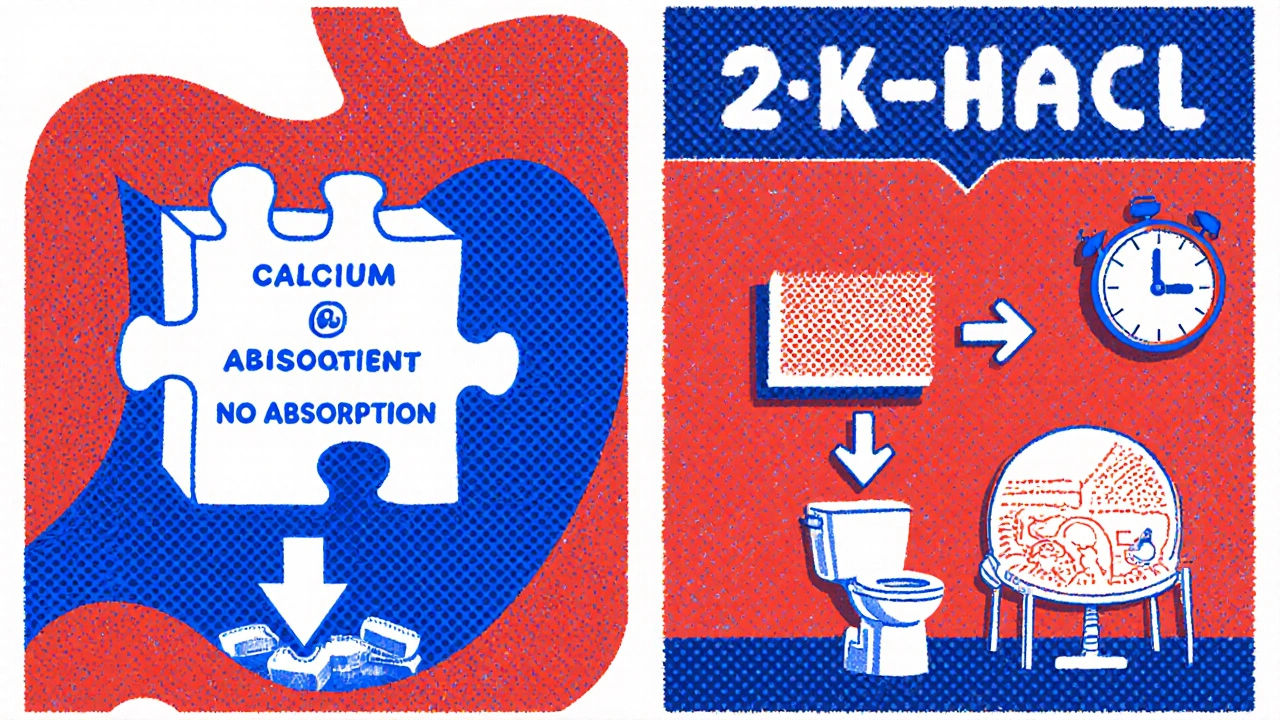
When to Take Calcium Supplements
Don’t stop taking calcium - you still need it. But you need to take it at the right time.
Wait at least 2 hours after your bisphosphonate before taking calcium. The best time? With dinner.
Why dinner? Because:
- Your stomach is already full, so the calcium won’t interfere with your morning drug.
- Vitamin D - which helps calcium absorb - works better when taken with food, especially fat.
- It’s easier to remember one routine: pill in the morning, calcium at night.
Many patients use pill organizers with two sections: one labeled “Bisphosphonate AM” and the other “Calcium PM.” One woman in her 60s tracked her bone density for 18 months using this method. Her hip density increased by 6.2% - the kind of result that prevents fractures.
What About Intravenous Bisphosphonates?
If you’re on zoledronic acid (Reclast) or ibandronate IV, you’re in luck. These are given once a year or once every few months through an IV drip. No stomach. No food. No calcium interference.
That’s why many older patients switch to IV. In people over 75, nearly half of bisphosphonate prescriptions are now IV - mostly because the oral version is too hard to manage.
But there’s a trade-off. IV bisphosphonates can cause flu-like symptoms for a day or two after the infusion. About 15-30% of patients feel achy, feverish, or tired. It’s usually mild and goes away on its own.
Also, your doctor will check your calcium levels before the infusion. If your calcium is too low, they’ll give you a supplement first. But once the IV is done, you can take your daily calcium normally - no waiting required.
Common Mistakes and Real-Life Failures
Most people think they’re following the rules. They’re not.
A 2023 survey from the National Osteoporosis Foundation found that 68% of patients struggled to remember the timing. The biggest offender? Morning coffee. Over half of those who failed said they took their bisphosphonate right before or after their coffee. That’s a problem. Coffee alone can reduce absorption by 50-60%.
Another common mistake: taking calcium with a multivitamin at breakfast. People don’t realize their vitamin has calcium in it. One 79-year-old woman in a Johns Hopkins case study took her alendronate and calcium together every day for two years. She had two spine fractures. Her doctor thought she was compliant. She was - just with the wrong routine.
Patients with GERD or swallowing problems often skip the upright rule. They lie down after taking the pill to avoid chest pain. That’s dangerous. It can cause serious esophageal damage.
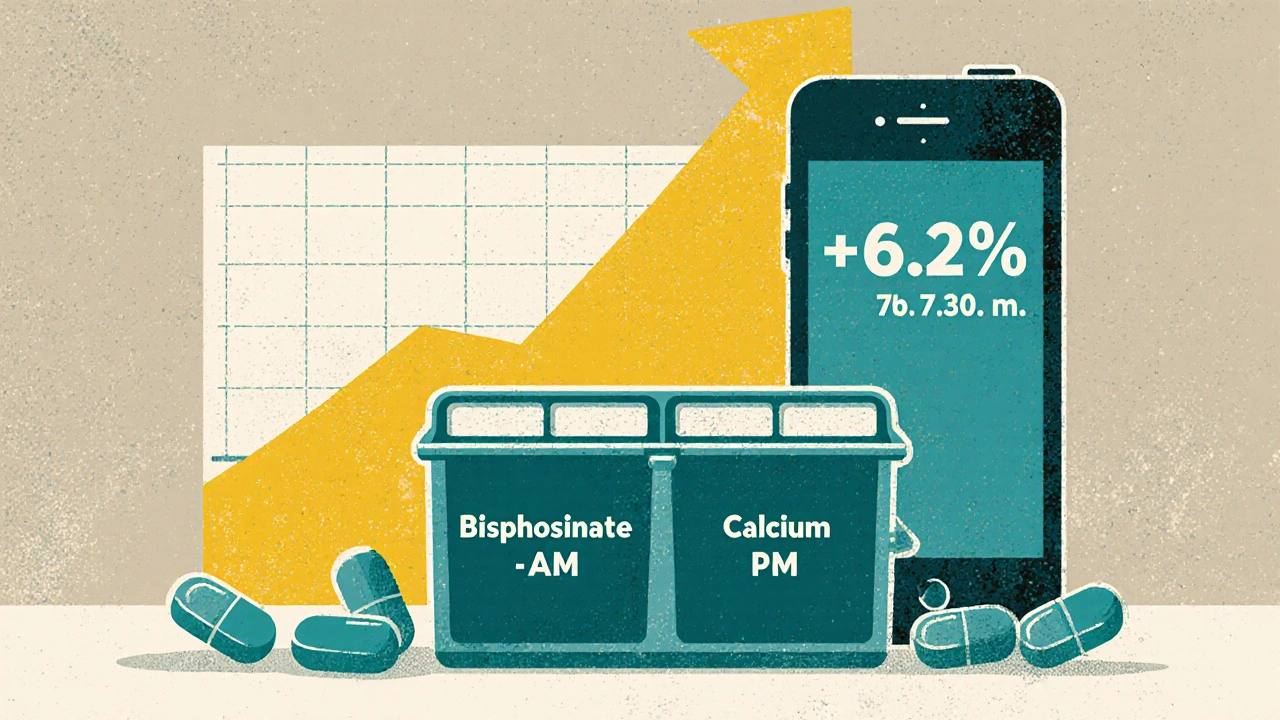
How to Succeed - Practical Tips
Here’s how to make this work, even if you’re busy, forgetful, or on other meds.
- Set two phone alarms: one for 7 a.m. (“Take bisphosphonate”) and one for 7:30 a.m. (“Wait 30 min”).
- Keep your bisphosphonate next to your water glass and your toothbrush - places you go every morning.
- Use a pill box with two compartments. Label them clearly: “Bisphosphonate - Morning” and “Calcium - Night.”
- Take all other morning medications (blood pressure, thyroid, etc.) after the 30- to 60-minute wait. That’s the window when your stomach is clear.
- Download the National Osteoporosis Foundation’s free app. It sends timed reminders and explains exactly what you can and can’t take with your meds. Over 28,000 people use it - and their adherence improved by 65%.
- If you miss a dose, don’t double up. Skip the day and resume the next morning. Don’t take it with food - it won’t help.
What If You Can’t Stick to the Rules?
Some people just can’t manage the morning routine. Maybe you have trouble swallowing pills. Maybe you’re on too many meds. Maybe you just forget.
That’s okay. You’re not failing. You just need a different option.
Dr. Andrea Singer, a bone specialist at MedStar Georgetown, says: “Inconsistent but continued use is better than stopping completely.” If you can’t wait 30 minutes, but you take your bisphosphonate every other day with food, you’re still getting some benefit. It’s not ideal - but it’s better than nothing.
Alternatives exist:
- IV bisphosphonates - yearly or quarterly infusions. No timing issues.
- Denosumab (Prolia) - a monthly or biannual injection. Works differently than bisphosphonates. No calcium interference.
- Abaloparatide (Tymlos) - a daily injection that builds bone, doesn’t just slow loss. Less sensitive to food. But it costs $3,000 a month.
Talk to your doctor. If the timing is too hard, there’s another way.
Final Check: Are You Doing It Right?
Ask yourself these questions:
- Did I take my bisphosphonate with plain water only?
- Did I wait 30-60 minutes before eating or drinking anything else?
- Did I stay upright the whole time?
- Did I take my calcium at least 2 hours later - preferably at dinner?
- Did I avoid calcium in my multivitamin or antacid during the morning window?
If you answered yes to all five, you’re doing it right. Your bones will thank you.
If you missed one, you’re probably not getting the full benefit. Adjust your routine. Use the app. Ask your pharmacist. Don’t give up - just fix the timing.
Can I take calcium and bisphosphonates on the same day?
Yes, but not at the same time. Take your bisphosphonate first thing in the morning on an empty stomach. Wait 30 to 60 minutes before eating or drinking anything else. Then take your calcium supplement at least 2 hours later - ideally with dinner. This separation prevents calcium from blocking the absorption of your osteoporosis medication.
What happens if I take calcium with my bisphosphonate by mistake?
If you accidentally take calcium with your bisphosphonate, skip that dose and wait until tomorrow. Don’t double up. The drug won’t work properly if calcium is present, so taking more won’t fix it. Just reset your routine the next morning. One mistake won’t ruin your treatment - but doing it regularly will.
Does coffee or tea affect bisphosphonates?
Yes. Even plain coffee or tea can reduce bisphosphonate absorption by 50-60%. That’s why you must wait at least 30-60 minutes after taking the pill before drinking anything except plain water. The same rule applies to juice, milk, or mineral water - only plain tap or bottled water is safe during the fasting window.
Can I take vitamin D with my bisphosphonate?
No - not in the morning. Vitamin D itself doesn’t interfere with bisphosphonates. But most vitamin D supplements are combined with calcium. Even if yours doesn’t, it’s safer to wait. Take your vitamin D with dinner, along with your calcium. This helps your body absorb both better and keeps your morning routine simple.
Are there bisphosphonates that don’t need strict timing?
Oral bisphosphonates all require strict timing. But intravenous versions - like zoledronic acid (Reclast) - don’t. These are given as an infusion once a year or every few months. Since they go straight into your bloodstream, food, calcium, and coffee don’t affect them. If the morning routine is too hard, ask your doctor about switching to IV.

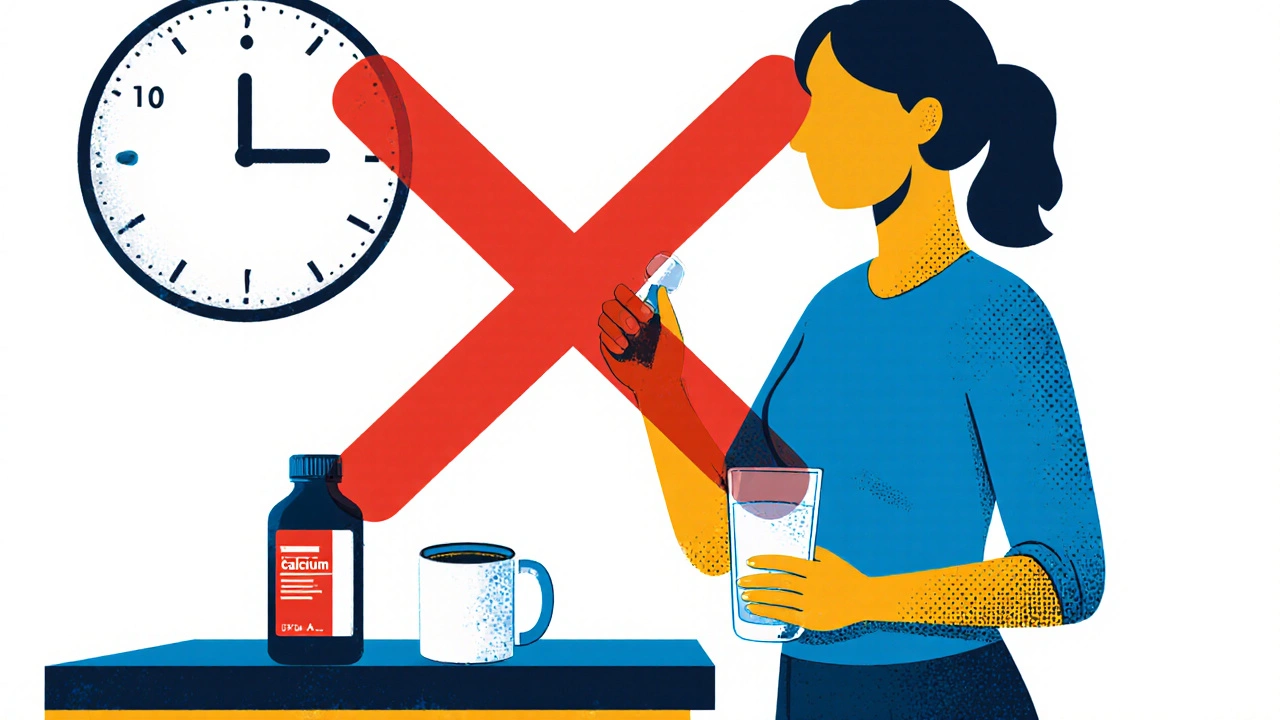
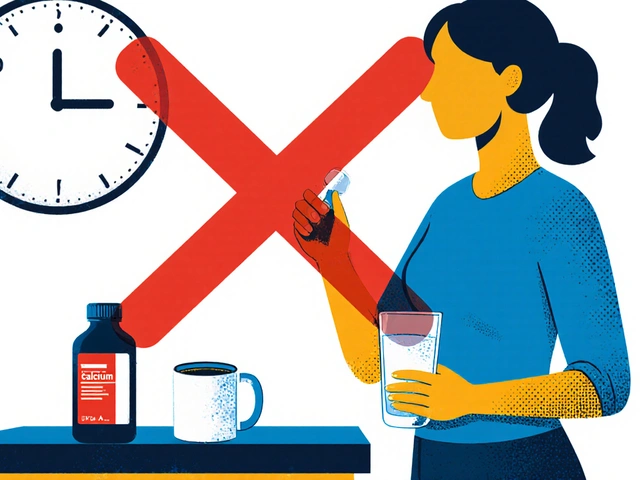
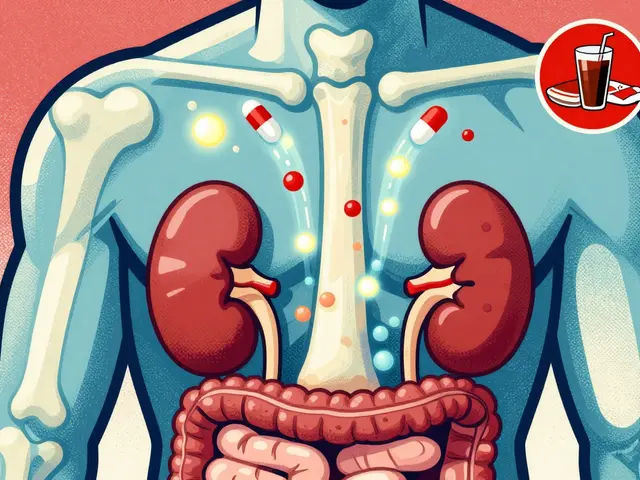
Jackson Olsen
October 31, 2025 AT 17:46Amanda Nicolson
November 1, 2025 AT 20:10Penny Clark
November 3, 2025 AT 06:30Niki Tiki
November 3, 2025 AT 16:18Jim Allen
November 5, 2025 AT 13:54Nate Girard
November 7, 2025 AT 07:51Carolyn Kiger
November 8, 2025 AT 06:48krishna raut
November 9, 2025 AT 08:45Prakash pawar
November 9, 2025 AT 18:39